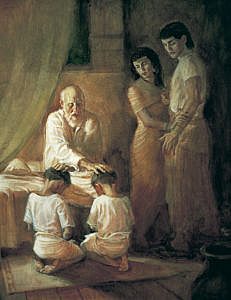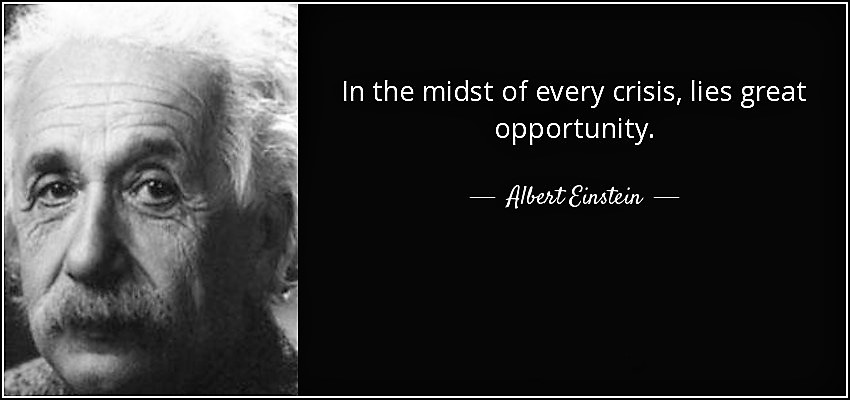As you have most likely figured out by now, I have a great deal of energy when it comes to the subject of the biblical figure Joseph. In my view, he is a significant personality not only in the history of the Hebrew people, but for the days ahead. Why? I think he is emblematic of just the type of person God uses to change history, especially in seasons of crisis. When religious leaders talk about bringing change, they typically are limited to doing so through influencing others. A case in point would be the US Civil Rights Movement. While it was a minister, Dr Martin Luther King and his church colleagues who brought the issue to the forefront of the national conscience, it was President Lyndon Johnson and the US Congress who made the Civil Rights Act a law in 1964. The power of modern civilizations lie in their governments and their economies. It is the people who make the rules and the money who determine the future of nations. The rest of us are left to react.
HEAVEN’S HALL of FAME
 One of the more preached passages of the New Testament is Hebrews 11, it’s a chapter concerning what are traditionally called “The Heroes of Faith”. It recounts the lives of spiritual men and women who have gone before us in living lives of faith in God’s eternal plan. These are the spiritual giants; those whose busts fill heaven’s Hall of Fame. One would get the impression from the way this passage is communicated, these people were all in the ministry! In fact, if they lived today, its assumed they would be on staff at one of our mega-churches. This may surprise some of you, but would you believe of the fifteen people mentioned in the passage, only one (yes one!) was involved in ministry. It just so happens, the last guy mentioned, Samuel worked at the Tabernacle located in Shiloh. Everyone else was either a political or business leader. This has always been the case throughout history and I cannot see it changing in the future. Joseph, is actually more typical of the kind of individual God uses to impact humanity than possibly those from the religious sector. Not that we haven’t had some outstanding religious leaders inspire us to be better people. When God needs to get the job done though, he recruits business leaders and those in government.
One of the more preached passages of the New Testament is Hebrews 11, it’s a chapter concerning what are traditionally called “The Heroes of Faith”. It recounts the lives of spiritual men and women who have gone before us in living lives of faith in God’s eternal plan. These are the spiritual giants; those whose busts fill heaven’s Hall of Fame. One would get the impression from the way this passage is communicated, these people were all in the ministry! In fact, if they lived today, its assumed they would be on staff at one of our mega-churches. This may surprise some of you, but would you believe of the fifteen people mentioned in the passage, only one (yes one!) was involved in ministry. It just so happens, the last guy mentioned, Samuel worked at the Tabernacle located in Shiloh. Everyone else was either a political or business leader. This has always been the case throughout history and I cannot see it changing in the future. Joseph, is actually more typical of the kind of individual God uses to impact humanity than possibly those from the religious sector. Not that we haven’t had some outstanding religious leaders inspire us to be better people. When God needs to get the job done though, he recruits business leaders and those in government.
Something I have found curious over the years, is how frequently when I have visited churches, I have discovered they have a “Joseph Ministry”. Typically, these ministries are focused on helping the less fortunate with practical matters such as food, shelter and clothing. Donations are collected from parishioners and a volunteer group from the church is assembled to administrate the donations appropriately or as they see fit. So why do I find this typical scenario so curious? Because I find myself wondering if anyone there actually read the story of Joseph? If they had, they would have discovered Joseph approached a pending national disaster with a very non-ministry mindset. Allow me to break it all the way down so you better understand my perspective.
SIGN UP HERE
It could be said of the church world that it is the largest volunteer organization in the world. No one attends church as a place of employment other than those on the church staff. Everyone else attends because they want to; it’s their choice. Those who give financially to the church do so voluntarily. Their pay checks aren’t being garnished with an obligatory 10% church tax. Those who show up to participate in church activities do so out of desire, not to conform to a legal obligation. When church ministries do humanitarian work, the teams are made up of volunteers who give of their time and resources to help others. No one is expecting to get paid and those receiving goods and services are not expecting to pay for them. The transactions which take place are based on love, compassion and maybe even a sense of restorative justice; making things right again. The reason I’m pointing all this out is Joseph’s solution to the pending national crisis looked nothing like this. He didn’t give anything away for free! Using Joseph as a Patron Saint in a church context is not only odd, it’s inaccurate in my mind.
As you might recall from my previous writing, Joseph had a rather astounding meteoric rise from prison to the palace. In a head spinning moment, he went from administrating the royal prison to becoming the second most powerful man in Egypt, if not the known world. We read in the 41st chapter of Genesis, the King of Egypt was impressed not only by Joseph’s discernment but with his solutions. His discernment had revealed a problem and his planning and management skills had come up with a strategy from which to execute. The King, took off his own signet ring, which was a symbol of his authority, and placed it on Joseph’s finger (vs 41). He then dressed him in some new upmarket clothing, put a gold chain around his neck and had him ride in his Rolls Royce chariot. Not only that, he received a new name, Zaphenath-Paneah (Savior) and a wife. Things were really looking up for him at this point. He didn’t just get any wife; he was given Asenath daughter of the High Priest (Potiphera) who lived in On and oversaw the nations worship of the Sun god Ra. He had married into religious royalty; he was a celebrity now. If one didn’t know this had taken place 4,000 years ago, one might think we were talking about the sudden rise of a musician in the Rap genre. This was like Jay Z marrying Beyoncé.
NOW THIS IS INTERESTING!
The story gets even more fascinating when we realize Joseph’s two boys; Manasseh & Ephraim, born of an Egyptian woman whose father was the head of a religious sect we would consider today to be “pagan”, received an inheritance with the eleven other sons of Israel in the land of Canaan. For purists, or those who need things neat and tidy, this is a problem. God has a way of coloring outside our man-made lines. God was at work in a situation where the participants had no idea as to the long term ramifications of the events taking place. Neither were they all that concerned with “religious rightness”. It would be another 400 years before Moses would appear on the scene and codify a distinctly Jewish identity. For the first half of the Old Testament time period, the worship of God was a very fluid and dynamic environment. God didn’t seem to be in a hurry or too worried about it. He didn’t appear to be overly concerned that people weren’t doing it exactly right! As He always has, He cared primarily about mankind’s heart and its motivations.
Something to consider, at this point in time, Joseph had no real idea of the long term implications of the project he was about to initiate. All he had a grid for in the moment was the next fourteen years. Vinton Cerf and Bob Kahn, the inventors of TCP/IP protocol in the early days of the Internet (1970’s), had no idea what they were unleashing. In fact, Vinton was hard of hearing and his frustration in communicating with other researchers was a key driving force behind his developing these protocols. The whole world’s economy today runs across a superhighway a couple guys started to solve a very simple and immediate problem. In 1939 an Englishmen named Nicholas Winston saved 669 Jewish children in Czechoslovakia from certain death at the hands of the Nazi’s. He transported them back to England and found families to take them in. Those 669 children now have children, grandchildren and great grandchildren numbering over 6,000 family members. Our personal decisions often have long term consequences we are unaware of at the time.
WARNING: PITFALLS AHEAD
 Joseph at this point knew he had a job to do and set out to get it done. He was proactive and strategic in his planning. He was on an unknown mission not to just save one nation but two. The idea this project would reunite him with his long lost family was not even in his thought processes. To think he would be used to preserve a new nation, in the incubator of Egypt, would have been beyond his comprehension. He was simply someone reacting to the world around him. He had learned a hard lesson many of us have to and that is to be good at what is right in front of us and the rest will take care of itself. Joseph would be tested and tried in new ways in the days ahead. He had accumulated power, wealth and fame; without an anchor of principle, personal integrity and humility he easily could have ship wrecked. In 2004, People Magazine published an article sharing research on those who had won a lot of money in the lottery. It destroyed the lives of most all of them. Joseph might have won the lottery, but the road ahead was filled with all kinds of situations just waiting to trip him up and take him out.
Joseph at this point knew he had a job to do and set out to get it done. He was proactive and strategic in his planning. He was on an unknown mission not to just save one nation but two. The idea this project would reunite him with his long lost family was not even in his thought processes. To think he would be used to preserve a new nation, in the incubator of Egypt, would have been beyond his comprehension. He was simply someone reacting to the world around him. He had learned a hard lesson many of us have to and that is to be good at what is right in front of us and the rest will take care of itself. Joseph would be tested and tried in new ways in the days ahead. He had accumulated power, wealth and fame; without an anchor of principle, personal integrity and humility he easily could have ship wrecked. In 2004, People Magazine published an article sharing research on those who had won a lot of money in the lottery. It destroyed the lives of most all of them. Joseph might have won the lottery, but the road ahead was filled with all kinds of situations just waiting to trip him up and take him out.
We read in Genesis 41:46 the first thing Joseph did was tour the country to assess what he had to work with as far as production and storage capacity. One thing to his advantage was Egypt had an arid climate and if stored correctly, grains could last for many years without rotting due to mildew. This was such a monumental task he would have to set up a government managed Department of Agriculture and a form of the IRS to collect the grain tax. When he had earlier stood before the King, and told him what was coming, he also had a solution which was a 20% grain tax lasting seven years. He would go on to administrate it though on a local level as we see in verse 48. They built storage facilities in each city and stored the grain grown around that particular city in a local silo. I find it fascinating that he was so successful in his undertaking, they could not keep up with the record keeping. This reminds me a bit of Peter’s frustrating fishing day and when God’s favor descended on the scene, he had caught so many fish his nets were tearing and his boats were sinking. I suppose we would all like that problem!
WHEN CRISIS COMES TO TOWN
Now here’s where it gets even more interesting in my mind, if Joseph was in “religious ministry”, when the record states in verse 56 that the people had run out of food, he would have gladly given it to them freely. This is what people in the ministry do… give away free stuff which they were given freely. This is NOT what happened in this situation, it says Joseph sold them grain! Not only did he sell grain back to his own countrymen, the record states “all the world came to Egypt to buy grain from Joseph”. Joseph was functioning with the mind and strategic thinking of a businessman. He saw opportunity in the midst of crisis. He was doing exactly what many Jewish businessmen have been doing since; moving towards the catastrophe because they see something no one else seems to see. It reminds me of a scene from Steven Spielberg’s disturbing movie “Schindlers List” which took place in Poland. While the Jews were being rounded up and moved to the Warsaw Ghetto (1940-1943), there was a Jewish businessman who had found a way to get a hold of some basic things people needed. He stored them in the sewer, and later sold them to those in need.
WE HATE THOSE GUYS!
 Those with the Joseph mindset are wired the same way. They are not followers or those who tend to go with the status quo. In fact, for many people they are irritatingly aggressive. In my world, they are the people I meet with who have built business empires and now are determining public policy and the future of the world’s economy. They don’t have a lot of friends as they are too busy winning! They are fearless and even reckless, we hate them and admire them at the same time. We have conflicted relationships with them but they don’t really care as they keep winning. No one liked Apple’s Steve Jobs but he didn’t care, he kept winning. In the past we called them “The Robber Barons” today we call them “Sharks”. What we see of Joseph in the bible he fits right in with this group. Once the people’s money had run out, he told them to sell him their livestock which I’m sure he got for pennies on the dollar as it was a depreciating asset given they couldn’t feed the cows. Later they came back for more and he told them to sell themselves to him as slaves of which they gladly did to stay alive. In the end he had built a monopoly for the King who now owned the land, the livestock and the people. Nothing at all ministry like about this scenario. This was a corporate takeover!
Those with the Joseph mindset are wired the same way. They are not followers or those who tend to go with the status quo. In fact, for many people they are irritatingly aggressive. In my world, they are the people I meet with who have built business empires and now are determining public policy and the future of the world’s economy. They don’t have a lot of friends as they are too busy winning! They are fearless and even reckless, we hate them and admire them at the same time. We have conflicted relationships with them but they don’t really care as they keep winning. No one liked Apple’s Steve Jobs but he didn’t care, he kept winning. In the past we called them “The Robber Barons” today we call them “Sharks”. What we see of Joseph in the bible he fits right in with this group. Once the people’s money had run out, he told them to sell him their livestock which I’m sure he got for pennies on the dollar as it was a depreciating asset given they couldn’t feed the cows. Later they came back for more and he told them to sell themselves to him as slaves of which they gladly did to stay alive. In the end he had built a monopoly for the King who now owned the land, the livestock and the people. Nothing at all ministry like about this scenario. This was a corporate takeover!
While people were pleased to have survived the famine, Joseph didn’t stop there, he went into business with them. He was on a roll. We note in Chapter 47, that from the grain he had remaining after the famine, he apportioned it out to the people under the condition the 20% grain tax stay in effect. A 20% return on investment… I’ll take that! One of the huge takeaways from this story, is that God is at work in and through people and situations which if we view them from the perspective of the religious world are going to miss completely what is going on. Often there are things in play which won’t be determined for generations after we leave the earth. History is replete with stories of how little people really understood in the moment of God’s grand plan. It’s often only in hindsight we realize what was really going on. I think a posture of humility is best when proclaiming what we think God is doing!









Really thought provoking.
Thank you!
Wow! This is so eye opening. I had never looked at it the way you’ve described it. I’m fascinated by the way you see the “Josephs” and their place in the kingdom. I can’t wait to learn more.
Thank you Sibo. I hope to have a book out at some point soon which will elaborate more.